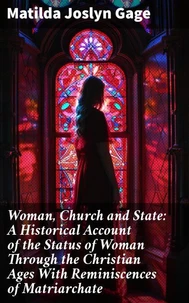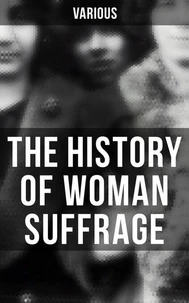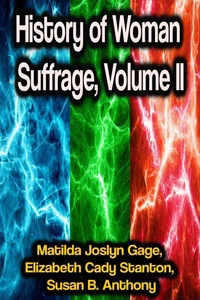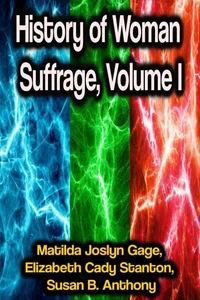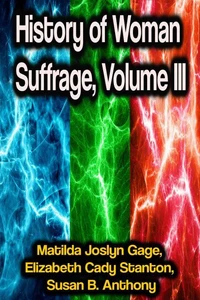Woman, Church & State. The Original Exposé of Male Collaboration Against the Female Sex
Par :Formats :
Disponible dans votre compte client Decitre ou Furet du Nord dès validation de votre commande. Le format ePub est :
- Compatible avec une lecture sur My Vivlio (smartphone, tablette, ordinateur)
- Compatible avec une lecture sur liseuses Vivlio
- Pour les liseuses autres que Vivlio, vous devez utiliser le logiciel Adobe Digital Edition. Non compatible avec la lecture sur les liseuses Kindle, Remarkable et Sony
 , qui est-ce ?
, qui est-ce ?Notre partenaire de plateforme de lecture numérique où vous retrouverez l'ensemble de vos ebooks gratuitement
Pour en savoir plus sur nos ebooks, consultez notre aide en ligne ici
- Nombre de pages465
- FormatePub
- ISBN859-65--4702948-9
- EAN8596547029489
- Date de parution28/05/2022
- Protection num.Digital Watermarking
- Taille901 Ko
- Infos supplémentairesepub
- ÉditeurDIGICAT
Résumé
In "Woman, Church & State, " Matilda Joslyn Gage presents a comprehensive analysis of the intertwining histories of women, religion, and institutional authority. Through her meticulous research and rigorous scholarship, Gage explores the historical marginalization of women within the Christian church and its socio-political ramifications. Her literary style is both persuasive and polemical, weaving together historical narratives, feminist theory, and legal analysis to challenge the patriarchal structures that have pervaded society.
Gage's work emerges from the late 19th-century feminist movement, capturing the urgency and audacity of her contemporaries while laying the groundwork for future gender discourse. Gage, a prominent suffragist and an influential figure in the early women's rights movement, was deeply influenced by her personal experiences and the inequalities she witnessed. Born in 1826, she dedicated her life to advocating for women's rights and critiquing the ecclesiastical practices that reinforced women's subordination.
Her involvement with the National Woman Suffrage Association and her correspondence with iconic activists such as Susan B. Anthony elucidate her commitment to challenging systemic injustice. "Woman, Church & State" is essential reading for those interested in understanding the historical roots of gender inequality and the role of religious institutions in perpetuating these disparities. Gage's groundbreaking insights not only illuminate the past but also resonate with contemporary feminist struggles, making this work a vital addition to the libraries of scholars, activists, and anyone seeking a more equitable society.
Gage's work emerges from the late 19th-century feminist movement, capturing the urgency and audacity of her contemporaries while laying the groundwork for future gender discourse. Gage, a prominent suffragist and an influential figure in the early women's rights movement, was deeply influenced by her personal experiences and the inequalities she witnessed. Born in 1826, she dedicated her life to advocating for women's rights and critiquing the ecclesiastical practices that reinforced women's subordination.
Her involvement with the National Woman Suffrage Association and her correspondence with iconic activists such as Susan B. Anthony elucidate her commitment to challenging systemic injustice. "Woman, Church & State" is essential reading for those interested in understanding the historical roots of gender inequality and the role of religious institutions in perpetuating these disparities. Gage's groundbreaking insights not only illuminate the past but also resonate with contemporary feminist struggles, making this work a vital addition to the libraries of scholars, activists, and anyone seeking a more equitable society.
In "Woman, Church & State, " Matilda Joslyn Gage presents a comprehensive analysis of the intertwining histories of women, religion, and institutional authority. Through her meticulous research and rigorous scholarship, Gage explores the historical marginalization of women within the Christian church and its socio-political ramifications. Her literary style is both persuasive and polemical, weaving together historical narratives, feminist theory, and legal analysis to challenge the patriarchal structures that have pervaded society.
Gage's work emerges from the late 19th-century feminist movement, capturing the urgency and audacity of her contemporaries while laying the groundwork for future gender discourse. Gage, a prominent suffragist and an influential figure in the early women's rights movement, was deeply influenced by her personal experiences and the inequalities she witnessed. Born in 1826, she dedicated her life to advocating for women's rights and critiquing the ecclesiastical practices that reinforced women's subordination.
Her involvement with the National Woman Suffrage Association and her correspondence with iconic activists such as Susan B. Anthony elucidate her commitment to challenging systemic injustice. "Woman, Church & State" is essential reading for those interested in understanding the historical roots of gender inequality and the role of religious institutions in perpetuating these disparities. Gage's groundbreaking insights not only illuminate the past but also resonate with contemporary feminist struggles, making this work a vital addition to the libraries of scholars, activists, and anyone seeking a more equitable society.
Gage's work emerges from the late 19th-century feminist movement, capturing the urgency and audacity of her contemporaries while laying the groundwork for future gender discourse. Gage, a prominent suffragist and an influential figure in the early women's rights movement, was deeply influenced by her personal experiences and the inequalities she witnessed. Born in 1826, she dedicated her life to advocating for women's rights and critiquing the ecclesiastical practices that reinforced women's subordination.
Her involvement with the National Woman Suffrage Association and her correspondence with iconic activists such as Susan B. Anthony elucidate her commitment to challenging systemic injustice. "Woman, Church & State" is essential reading for those interested in understanding the historical roots of gender inequality and the role of religious institutions in perpetuating these disparities. Gage's groundbreaking insights not only illuminate the past but also resonate with contemporary feminist struggles, making this work a vital addition to the libraries of scholars, activists, and anyone seeking a more equitable society.



